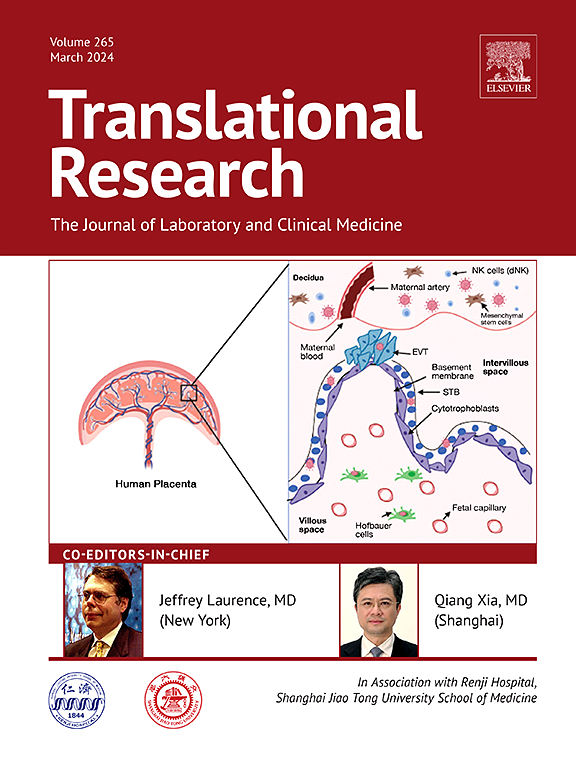Epigenetically targeting PRMT5 promotes antitumor immunity by inducing endogenous retroviruses expression and triggering viral mimicry response
IF 5.9
2区 医学
Q1 MEDICAL LABORATORY TECHNOLOGY
引用次数: 0
Abstract
Colorectal cancer (CRC) is one of the most common cancers worldwide. Although immune checkpoint blockade (ICB) has transformed CRC treatment, the low response rate and immune resistance remain significant challenges. In recent years, epigenetic therapies have been shown to induce viral mimicry response to overcome immune resistance and increase the effectiveness of ICB. However, as an epigenetic modifier, the intrinsic function of PRMT5 in controlling innate immune signaling, viral mimicry, and the tumor microenvironment in CRC remains to be elucidated. Here, we report that PRMT5 inhibition attenuates CRC growth and epigenetically targeting PRMT5 remolds the tumor immune microenvironment, thereby enhancing the therapeutic efficacy of ICB. Mechanistically, PRMT5 knockdown increases endogenous retroviruses (ERVs) expression and dsRNA formation and causes DNA repair incompetence and genomic instability. These changes, combined with the elevated expression of RIG-I/MDA5/STING, trigger innate immune activation and viral mimicry response, thereby facilitating immune cell infiltration and enhancing ICB effectiveness. Furthermore, PRMT5 knockdown reduces H3R2me2s and H3R8me2s levels, and epigenetically promotes innate immune responses. Our study reveals the tumor intrinsic role of PRMT5 in controlling ERVs and innate sensors expression, providing perspectives for the epigenetically targeting of PRMT5 to induce viral mimicry response and enhance antitumor immunity in CRC.
表观遗传靶向PRMT5通过诱导内源性逆转录病毒表达和触发病毒模仿反应来促进抗肿瘤免疫。
结直肠癌(CRC)是世界上最常见的癌症之一。尽管免疫检查点阻断(ICB)已经改变了结直肠癌的治疗,但低应答率和免疫耐药性仍然是重大挑战。近年来,表观遗传疗法已被证明可以诱导病毒模仿反应以克服免疫抵抗并提高ICB的有效性。然而,作为一种表观遗传修饰因子,PRMT5在CRC中控制先天免疫信号、病毒模仿和肿瘤微环境的内在功能仍有待阐明。在这里,我们报道了抑制PRMT5可以减缓结直肠癌的生长,并通过表观遗传靶向PRMT5重塑肿瘤免疫微环境,从而提高ICB的治疗效果。从机制上讲,PRMT5敲低会增加内源性逆转录病毒(erv)的表达和dsRNA的形成,并导致DNA修复功能不全和基因组不稳定。这些变化,结合rig - 1 /MDA5/STING表达升高,触发先天免疫激活和病毒模仿反应,从而促进免疫细胞浸润,增强ICB的有效性。此外,PRMT5敲低可降低H3R2me2s和H3R8me2s水平,并从表观遗传学上促进先天免疫反应。我们的研究揭示了PRMT5在控制erv和先天传感器表达中的肿瘤内在作用,为PRMT5的表观遗传靶向诱导CRC病毒模仿反应和增强抗肿瘤免疫提供了视角。
本文章由计算机程序翻译,如有差异,请以英文原文为准。
求助全文
约1分钟内获得全文
求助全文
来源期刊

Translational Research
医学-医学:内科
CiteScore
15.70
自引率
0.00%
发文量
195
审稿时长
14 days
期刊介绍:
Translational Research (formerly The Journal of Laboratory and Clinical Medicine) delivers original investigations in the broad fields of laboratory, clinical, and public health research. Published monthly since 1915, it keeps readers up-to-date on significant biomedical research from all subspecialties of medicine.
 求助内容:
求助内容: 应助结果提醒方式:
应助结果提醒方式:


